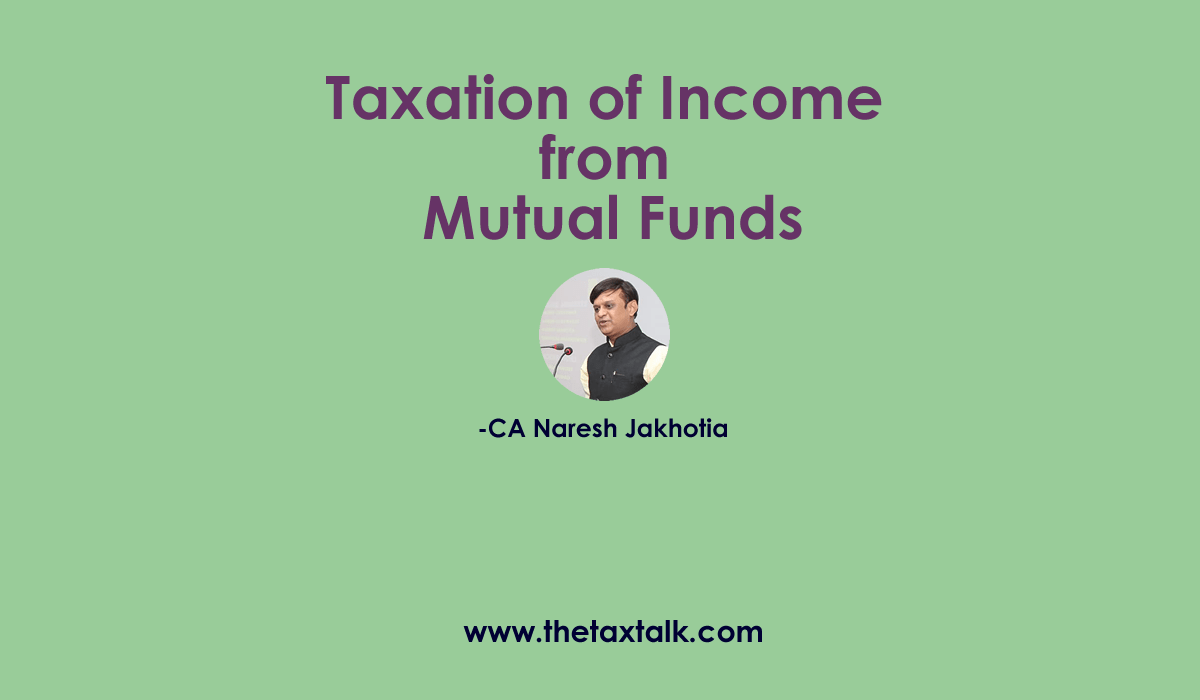![]()
Taxation of Income from Mutual Funds
Investment in mutual funds is increasing at a rapid pace as all other alternate investments avenues have lost its charm. Multiple diversified options, easy access, liquidity with past tracks records of handsome returns have made mutual fund investment as one of the most preferred choice of investment for the taxpayer.
Mutual fund take care of investment by spreading investment in different companies, sectors & options making it less risky as compared to direct investment by the investor. Of course, better returns by way of interest/dividends/ capital gain is the main driving force behind investment in mutual funds. Question arises about the tax implications of mutual funds, more particularly after the re-introduction of long term capital gain tax on shares.
Taxation of income arising from mutual funds investments depends upon on the nature of fund i.e., equity fund, debt fund, balanced fund, arbitrage fund etc. It also depends upon the duration of investments i.e., whether it’s a short-term or long-term. The same is summarized as under:
Debt schemes
- If the investment period in debt fund is less than 36 months then returns would be considered as short term capital gains. Short-term capital gain is treated like any other income of the taxpayers & is taxable as per the applicable income tax slab of the taxpayers. No special tax rate exists for such gain.
- If debt investments are held for a period of 36 months or more, returns would be considered as long-term capital gains and are taxable at a special tax rate of 20% with indexation benefit.
Equity schemes:
If the mutual funds invest more than 65% of its corpus in equities, it would be treated as equity oriented mutual fund. Even Arbitrage funds, Equity-Linked Saving Scheme (ELSS) & balanced funds are part of equity oriented mutual fund for the purpose of taxation. However, International fund stocks abroad are considered as debt fund for taxation purpose. If investment is redeemed after a holding period of 12 months or more then returns would be treated as Long Term Capital Gains (LTCG).
Such LTCG is exempt from tax up to overall cap of Rs. 1 lakh and amount exceeding Rs. 1 Lakh is taxed @ 10% without any indexation benefit. If the investment in equity oriented mutual fund is redeemed within 12 months, returns would be treated as short-term capital gains and taxable at a special rate of flat 15% u/s 111A of the Income Tax Act-1961. There is no change by the Finance Act- 2018 for taxation of STCG of equity mutual funds.
Taxation of SIPs:
Systematic Investment Plan (SIP) is the method of investing a fixed amount in a mutual fund in a periodic manner (may be weekly, fortnightly, monthly, quarterly or yearly). Gains arising from SIPs are taxed according to nature of mutual fund & the holding period as already mentioned above. However, for the purpose of taxation, each individual SIP is treated as a separate & fresh investment and gain on it is required to be computed separately. For example, if a person has invested ₹ 10,000 per month for 18 months in equity oriented SIP & has redeemed it after 18 months of its commencement.
As mentioned, each individual SIP is considered as separate investment from taxation perspective. At the time of redemption after 18 months, entire accumulated amount received will not be tax-free. Only the gains from first 6 SIP wherein holding period is exceeding 12 months would be tax-free subject to overall cap of Rs. 1 Lakh & amount exceeding Rs. 1 Lakh would be subject to tax @ 10%. The rest of the gains on investment of 12 SIP would be subject to short-term capital gains tax as it will be having holding period of less than 12 months.
Chart summarizing Period of holding for reckoning Short Term vis a vis Long term:
| Nature of Investment / Classification | STCG | LTCG |
| Equity funds, Balanced fund, Arbitrage fund | Less than 12 months | 12 months & more |
| Debt funds, Fund of MF, MF investing in International equities | Less than 36 months | 36 months & more |
Chart summarizing Taxation of STCG & LTCG of Mutual Fund:
| Nature of Investment / Classification | STCG Tax Rate | LTCG Tax Rate |
| Equity funds, Balanced fund, Arbitrage fund | 15% | 10% on LTCG in excess of Rs. 1 Lakh |
| Debt funds, Fund of MF, MF investing in International equities | As per tax slab | 20% after indexation |
Tax Planning vis a vis Mutual Funds investment:
Longer is the holding period of mutual fund units, the more tax-efficient investment becomes. When an individual shuffle investments from one company to another company, tax liability arises. From taxation perspective, investment in equity oriented mutual fund is less taxing as compared to debt fund.

